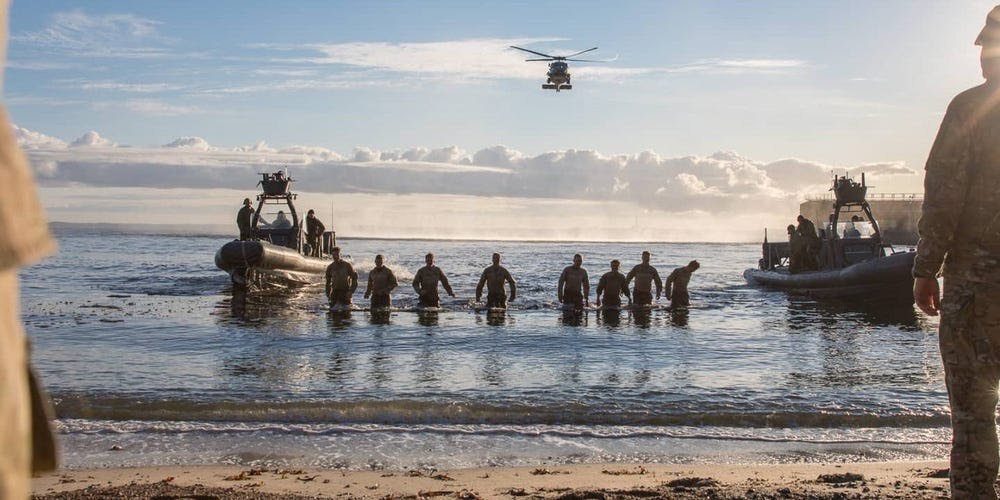- Meet the Danish Frogmen who just took down a boatful of pirates in the Atlantic
- In November, a Danish frigate off West Africa sent a group to investigate a suspicious boat.
- The Fromandskorpset deployed took down the suspected pirates without Danish casualties.
- It was a rare look at Denmark’s Frogman Corps, a little-known but highly skilled commando unit.
By Stavros Atlamazoglou
At the end of 2021, a widely overlooked incident in the Atlantic Ocean showcased the deadly effectiveness of the Fromandskorpset, the Frogman Corps, who are Denmark’s equivalent to the US Navy SEALs.
In November, the Danish frigate Esbern Snare was conducting an antipiracy patrol in the Gulf of Guinea south of Nigeria when it received reports of suspicious activity nearby.
The Danish warship sailed toward the area of concern and found a small, fast-moving motorboat with nine men on board shadowing merchant vessels in the area.

After identifying the men as pirates, the Esbern Snare deployed its contingent of Frogmen aboard rigid-hull inflatable boats to interdict the motorboat.
After closing in, the Danes ordered the pirates to halt and eventually fired warning shots so the special operators could board the motorboat.
The pirates fired back, and the Danish commandos returned fire, killing four pirates and wounding one while suffering no casualties. The motorboat sank after the shootout, and the pirates were taken aboard Esbern Snare.
The incident was a rare glimpse of one of the world’s least-known special-operations units in action.
A select few

The selection and operator-training course for the Frogman Corps is one of the most selective in the world, with an incredibly high attrition rate.
Out of the 500 to 600 applicants who volunteer for the course each year, only a handful make it and graduate into the ranks of the Frogmen. Since the unit’s inception in the late 1950s, there have been fewer than 400 Frogmen.
The pipeline to become a naval commando takes roughly nine months and is based on the US Navy Basic Underwater Demolition/SEAL and the UK Special Boat Service training and selection processes.
There is a “hell week,” during which students are pushed to their physical and mental limits, in addition to basic and advanced combat diving, airborne operations, small-unit tactics, and land warfare.
Maritime counterterrorism and much more

Given the small size of the Danish special-operations community, the Frogman Corps is responsible for several mission sets, including maritime counterterrorism, special reconnaissance, underwater unconventional warfare, direct action, close protection, and visit, board, search, and seizure.
The Danish commandos have also developed a reputation for antipiracy operations. The Danish Frogmen recaptured a hijacked merchant vessel in 2010.
As a NATO member, Denmark gets to work closely with US special-operations units, often participating in joint exercises with Army Green Berets, Air Commandos, Navy SEALs, and Navy Special Warfare Combatant-Craft operators.

Danish Frogmen “are top-class combat divers, and we train with them often. They are a small community, but they are tough, and young Green Beret combat divers always learn new things from them in joint training events,” a retired Army Green Beret who requested anonymity to describe his experiences told Insider.
The Frogmen also attend US special-operations and conventional courses, including the US Army Airborne School, Army Ranger School, and Special Forces Underwater Operations School.
Danish special-operations units also fought in Afghanistan and developed a solid reputation for professionalism, discipline, and tactical effectiveness.
Glorious ancestors

Created in 1957, the Danish Frogman Corps traces its lineage in World War II and the British special-operations units that fought the Germans and Italians in North Africa and Europe.
In 1941, a British officer named David Stirling created the Special Air Service to conduct unconventional warfare and strategic reconnaissance operations behind the Axis lines in North Africa.
The unit was so effective — at one point, it had destroyed more German and Italian aircraft on the ground than the Royal Air Force — that the British military decided to develop a maritime version of the SAS.
The idea had been promoted a year earlier, in 1940, by another enterprising British officer who persuaded the Royal Navy to create a special-operations unit that would take the fight to the Nazis on the coasts and rivers of occupied Europe.

Named the Special Boat Section — later renamed the Special Boat Service, which it is still called — the unit primarily operated around the islands and coasts of Italy and Axis-occupied Greece.
After taking heavy casualties in several operations in 1942, the SBS was absorbed by the SAS.
In a development peculiar to World War II, some troops whose countries were overrun by the Nazis served in British units. Maj. Anders Lassen, a Dane, was one of them, and he became the only foreigner to win the Victoria Cross — the British equivalent of the Medal of Honor — during the war.
When the Frogman Corps was created in 1957, it drew lessons and experiences from veterans who served with the SBS and used knowledge and help from the US’s Underwater Demolition Teams, the forefathers of the modern Navy SEALs.
Stavros Atlamazoglou is a defense journalist specializing in special operations, a Hellenic Army veteran (national service with the 575th Marine Battalion and Army HQ), and a Johns Hopkins University graduate.
Credits | Business Insider

